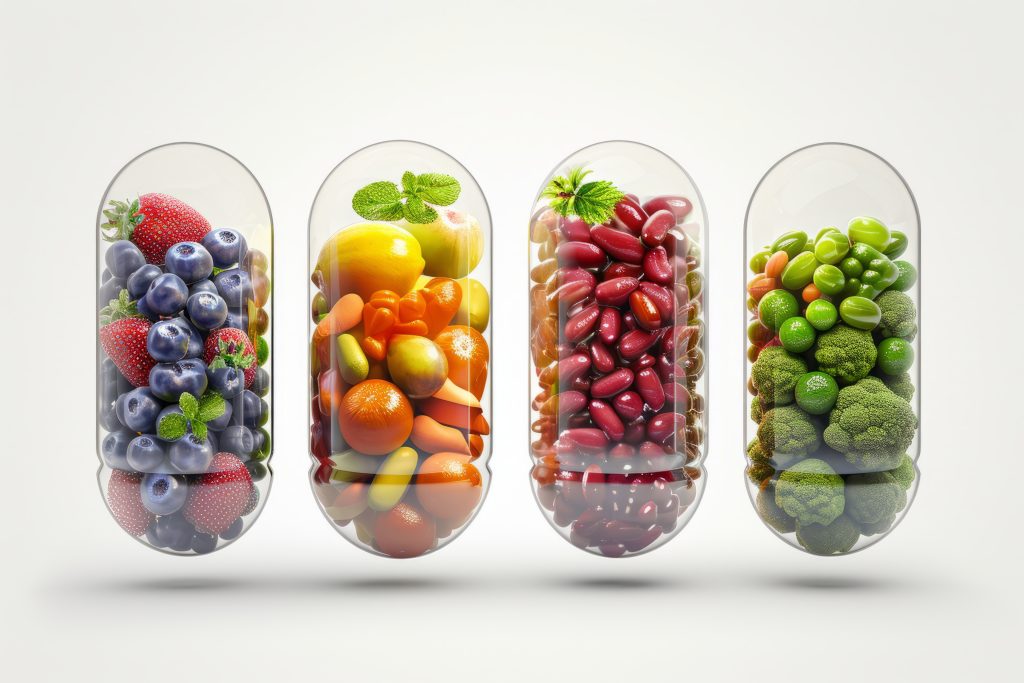The growing demand for dietary supplements reflects a shift toward proactive health management and nutritional support. Whether aimed at improving daily nutrient intake or addressing specific health concerns, supplements play an increasingly prominent role in modern well-being.
In this evolving landscape, formulation combines both preserving nutrients and enhancing them. Consumers today seek products that do more than meet nutritional needs; they expect added value in the form of functional health benefits. In this context, natural antioxidants in supplements serve a dual purpose: they extend shelf life and simultaneously fortify and enrich the nutritional profile of the product.
Improving shelf life and stability with natural antioxidants in supplements
Our bodies generate free radicals as an inevitable by-product of converting food into energy, but they are also formed after exercise or exposure to tobacco smoke, air pollution, and sunlight. At very high levels, they are capable of damaging cells and genetic material.
Free radicals have in common the need for electrons, which they acquire from any suitable substance that can yield them. This electron theft can radically alter the structure or function of the “donor” substance. This process, called oxidation is a critical aspect in both cellular metabolism and the formulation of foods and supplements, as it can degrade the active ingredients, leading to a loss of product efficacy.
During production and storage, dietary supplements are exposed to oxygen, light, and heat, factors that accelerate oxidation and reduce nutritional efficacy. This is particularly critical in products containing lipids, omega-3 fatty acids, or herbal ingredients, which are highly sensitive to oxidative degradation. As a result, manufacturers are increasingly turning to natural antioxidants in supplements to preserve both functionality and product appeal.
However, natural antioxidant benefits extend beyond protection. Their presence enables manufacturers to reduce synthetic additives, support cleaner labels, and respond to the increasing demand for transparency and natural sourcing. Products like food and supplements for liver health or food supplements for prostate health benefit significantly from these natural compounds, which help maintain the effectiveness of sensitive ingredients such as omega-3 fatty acids, polyphenols, and herbal extracts.
There are hundreds, probably thousands, of different substances that can act as antioxidants. The best known are vitamin C, vitamin E, beta-carotene, and other related carotenoids, along with the minerals selenium and manganese.
Top natural antioxidants used in supplements
Natural antioxidants are widely used in dietary supplements due to their potential health benefits, but not only. Some of them can also protect formulations against oxidation. Some examples are:
- Vitamin E: a fat-soluble antioxidant naturally present in vegetable oils, which makes it suitable for incorporation into oil-based supplements. It protects polyunsaturated fatty acids in cell membranes from oxidation, regulates the production of reactive oxygen and nitrogen species, and plays a role in cellular signaling. This vitamin encompasses eight compounds, four tocopherols, and four tocotrienols, but only α-tocopherol satisfies the human nutritional requirement, as the body does not interconvert the different forms.
- Vitamin C: it has great power to protect cells from the effects of free radicals, molecules that are produced when the body breaks down food or is exposed to tobacco smoke and radiation from the sun, X-rays, or other sources, and to improve the stability of supplements.
- Polyphenols: these organic compounds are characterized by the presence of multiple phenol units and are found in fruits, vegetables, spices, and cocoa. They provide vasodilatory effects, improve lipid profiles, and reduce low-density lipoproteins (LDL) oxidation. They can also be used as supplements for inflammation.
- Carotenoids: naturally occurring yellow, green, and orange pigments widely distributed in nature, and synthesized by plants, certain bacteria, fungi, and alga. They are essential for eye health and skin protection and are commonly included in antioxidant products.
Some of these top natural antioxidants, such as vitamin E, do not just safeguard the product—they enrich it with bioactive compounds that support diverse health functions. This synergy of protection and nutritional enhancement aligns with the growing scientific interest in natural antioxidants in human health and disease, where antioxidants are studied not only as additives, but also as functional nutrients.
Nutrabiol®: enriching and fortifying supplement formulations
A prime example of an ingredient that combines antioxidant protection with nutritional value is Nutrabiol®, Btsa’s natural tocopherol-based solution. Nutrabiol® adds nutritional richness to supplements, adding the possibility for the product to bear the “Source of vitamin E” claim. It functions as a natural antioxidant vitamin that protects cells and enhances the final formulation.
Nutrabiol® is derived from natural sources of antioxidants—specifically, non-GMO vegetable oils. With concentrations between 1000 and 1300 IU, and esterified options for enhanced stability, it is particularly suited for complex formulations that demand both performance and label transparency.
Whether included in prostate health supplements, liver health supplements, or general wellness blends, Nutrabiol® extends shelf life and provides essential micronutrients.
As innovation in the supplement industry moves toward multifunctional and enriched formulations, BTSA continues to lead the industry by providing antioxidant systems that protect, strengthen, and enhance the value of dietary supplements.

